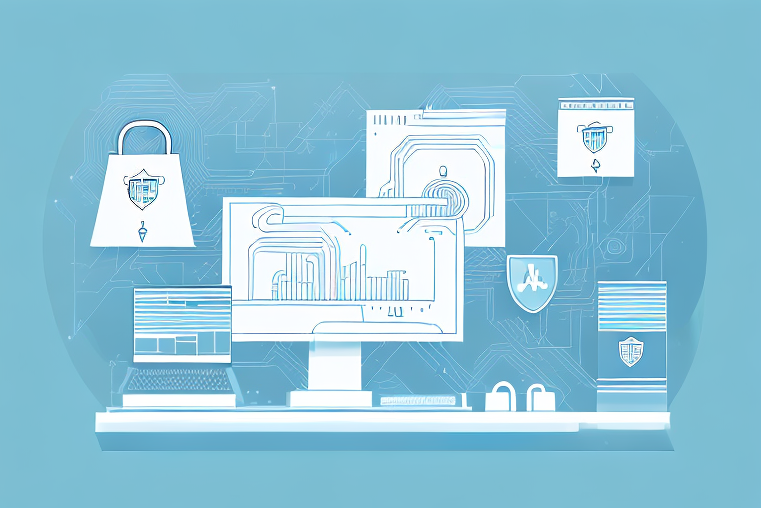Exploring the Growing Market for Cyber Security Jobs
13 Jun, 20235
Contents
- The Increasing Demand for Cyber Security Professionals
- Factors Driving the Growth in Cyber Security Jobs
- Industries with the Highest Demand for Cyber Security Experts
- The Role of Government and Legislation in Cyber Security Job Growth
- Essential Skills and Qualifications for Cyber Security Careers
- Technical Skills and Certifications
- Soft Skills for Success in Cyber Security
- The Importance of Continuous Learning and Skill Development
- Job Roles and Opportunities in Cyber Security
- Entry-Level Cyber Security Positions
- Mid-Level and Management Roles
- Specialized Cyber Security Careers
- The Future of Cyber Security Jobs
- Emerging Technologies and Their Impact on Cyber Security
- The Role of Artificial Intelligence and Automation in Cyber Security
- Addressing the Cyber Security Skills Gap
Exploring the Growing Market for Cybersecurity Jobs
In recent years, the demand for cybersecurity professionals has skyrocketed due to the increasing number of cyber threats and attacks targeting individuals, businesses, and governments alike. With the widespread adoption of digital technologies and the internet, cybersecurity has become a critical concern for many industries and organisations, leading to a growing market for cybersecurity jobs.
The Increasing Demand for Cybersecurity Professionals
The need for cybersecurity professionals has been steadily increasing over the past decade, with job growth in this field outpacing most other occupations. According to the Bureau of Labour Statistics, employment in information security is projected to grow 31% from 2019 to 2029, far faster than the average for all occupations.
Factors Driving the Growth in Cybersecurity Jobs
There are several factors contributing to the growing demand for cybersecurity professionals. First and foremost is the proliferation of cyber threats, which have become more sophisticated and frequent in recent years. Today, cybercriminals use a variety of tactics to launch cyber attacks, from ransomware and phishing scams to social engineering and insider threats.
As a result, businesses and organisations are investing more in cybersecurity measures to protect themselves from these threats. This includes hiring more cybersecurity professionals to implement and manage these measures.
Additionally, the rise of cloud computing, internet-connected devices, and the Internet of Things (IoT) has created new vulnerabilities that require specialised cybersecurity expertise to address. As more businesses and organisations continue to adopt these technologies, the need for qualified cybersecurity professionals is expected to increase even further.
Industries with the Highest Demand for Cybersecurity Experts
The demand for cyber security jobs is spread across a wide range of industries and organisations, with some sectors experiencing particularly high demand. The finance and healthcare industries, for example, are particularly vulnerable to cyber attacks and therefore require robust cyber security measures and personnel.
Financial institutions are a popular target for cybercriminals due to the sensitive financial information they possess. A cyber attack on a financial institution can result in the theft of millions of dollars, as well as damage to the institution's reputation.
Similarly, healthcare organisations are a prime target for cybercriminals due to the sensitive patient information they store. A data breach at a healthcare organisation can result in the theft of personal information, including medical records, which can be sold on the dark web for a high price.
Other industries such as government, education, and retail are also seeing an increased need for cyber security professionals as they become more digitised and connected. The government, for example, holds a vast amount of sensitive information that must be protected from cyber attacks. Education institutions hold student and faculty information, while retail businesses hold customer payment information.
The Role of Government and Legislation in Cyber Security Job Growth
The government has become increasingly involved in cyber security as well, creating additional opportunities for cyber security professionals. In recent years, numerous state and federal regulations have been introduced to help protect sensitive data and personal information from cyber threats.
These regulations, including GDPR, HIPAA, and CCPA, require businesses to implement specific data protection measures and maintain compliance with certain standards. As a result, organisations are investing more in cyber security to ensure compliance, leading to an increased demand for professionals with specialised skills and experience.
Furthermore, the government has also created agencies and initiatives dedicated to cyber security, such as the Cybersecurity and Infrastructure Security Agency (CISA) and the National Initiative for Cybersecurity Education (NICE). These organisations provide resources and support for cyber security professionals, as well as opportunities for training and career advancement.
Essential Skills and Qualifications for Cybersecurity Careers
Cybersecurity is a dynamic and exciting field that requires a unique blend of technical and soft skills. Cybersecurity professionals are responsible for protecting organizations from cyber attacks and ensuring the confidentiality, integrity, and availability of sensitive data. In this article, we will discuss the essential skills and qualifications required for a successful career in cybersecurity.
Technical Skills and Certifications
One of the key requirements for a career in cybersecurity is technical proficiency in areas such as networking, programming, and operating systems. Cybersecurity professionals need to have a deep understanding of how computer systems work, as well as the ability to identify and mitigate potential vulnerabilities. They are often required to design, implement, and maintain complex security systems and protocols, making technical skills critical to their success.
Some of the key technical certifications for cyber security professionals include the Certified Information Systems Security Professional (CISSP), Certified Information Security Manager (CISM), CompTIA Security+, and Certified Ethical Hacker (CEH), among others. These certifications demonstrate a high level of technical expertise and are highly valued by employers in the cybersecurity industry.
Soft Skills for Success in Cybersecurity
While technical skills are essential, they are not the only factor in a successful cybersecurity career. Soft skills such as communication, problem-solving, and teamwork are equally important, as cyber security professionals are often required to work closely with colleagues from other departments and communicate complex security issues to non-technical stakeholders.
Strong project management and leadership skills can also be beneficial in more senior roles. Cybersecurity professionals may be responsible for managing teams, overseeing projects, and making strategic decisions that impact the entire organisation. The ability to effectively communicate with stakeholders and manage multiple priorities is essential for success in these roles.
The Importance of Continuous Learning and Skill Development
Finally, it is important for cybersecurity professionals to stay up-to-date with the latest technologies, threats, and best practices in the field. Cybersecurity is a rapidly evolving industry, and those who stay current with the latest tools and techniques will be best equipped to succeed in the long run.
Continuing education, certifications, and industry events can all aid in this effort. Cybersecurity professionals should also seek out opportunities for hands-on experience, such as participating in capture the flag competitions or contributing to open source projects. By continuously learning and developing their skills, cybersecurity professionals can stay ahead of the curve and make a meaningful impact in their organisations.
Job Roles and Opportunities in Cybersecurity
Cyber security has become a critical aspect of modern day businesses and organisations. With the increasing reliance on technology, cyber-attacks have become more frequent and sophisticated, making it essential for companies to have a strong cybersecurity team in place. As a result, there are various job roles and opportunities available in the field of cybersecurity.
Entry-Level Cybersecurity Positions
Entry-level cybersecurity positions can include roles such as security analyst, network security engineer, or security operations centre (SOC) analyst. These positions typically require a foundational knowledge of cybersecurity and technical skills in areas such as networking, firewalls, and intrusion detection.
As a security analyst, you will be responsible for monitoring and analysing security systems, identifying potential security threats, and implementing security measures to protect against these threats. Network security engineers design and implement security measures to protect computer networks from unauthorised access, while SOC analysts monitor and analyse security systems and respond to security incidents.
Entry-level positions are a great way to gain experience in the field of cybersecurity and build a strong foundation of technical skills. With the increasing demand for cybersecurity professionals, there are plenty of opportunities for growth and advancement.
Mid-Level and Management Roles
Mid-level and management roles in cyber security can include positions such as security architect, security manager, or chief information security officer (CISO). These positions require a higher degree of experience and leadership skills, as individuals are responsible for designing and implementing complex security programs and leading teams of professionals.
As a security architect, you will be responsible for designing and implementing security systems and protocols to protect against potential security threats. Security managers oversee the day-to-day operations of a company's cybersecurity team, while CISOs are responsible for the overall security strategy of an organisation.
Mid-level and management roles offer opportunities for growth and advancement within an organisation. With the increasing importance of cybersecurity in today's business landscape, these positions are in high demand and offer competitive salaries and benefits.
Specialised Cybersecurity Careers
There are also specialised cybersecurity careers that require unique skills and experience. These can include roles such as ethical hacker, digital forensics analyst, or security consultant. Individuals in these positions bring a specialised perspective to cybersecurity and often work on high-profile or unique projects.
Specialised cyber security careers offer unique challenges and opportunities for professionals to apply their skills in innovative ways. These positions often require a high degree of expertise and experience, making them highly sought after by organisations in need of specialised cyber security support.
The Future of Cybersecurity Jobs
Emerging Technologies and Their Impact on Cybersecurity
As technology continues to evolve, so too will the job market for cybersecurity professionals. Emerging technologies such as blockchain, artificial intelligence, and quantum computing offer both new opportunities and new challenges for the field. Cybersecurity professionals will need to stay up-to-date with the latest technological advancements to effectively secure digital infrastructures.
The Role of Artificial Intelligence and Automation in Cybersecurity
AI and automation are also playing an increasingly important role in cybersecurity, with many organisations using machine learning and other tools to automate routine tasks and detect anomalous behaviour. While these technologies can improve efficiency and accuracy, they can also create new vulnerabilities that require specialised attention from cyber security professionals.
Addressing the Cybersecurity Skills Gap
Finally, addressing the cybersecurity skills gap will continue to be a critical priority for the industry. Despite high demand for cyber security professionals, many organisations struggle to find qualified candidates to fill open roles. To address this challenge, industry leaders are increasingly investing in education and training programs, creating opportunities for individuals from diverse backgrounds to enter the field.
As digital technologies continue to transform nearly every aspect of our lives, cybersecurity has become an essential and expanding field. The growth of cyber threats and regulations, combined with the rapid expansion of digitally connected devices and systems, has created a robust job market for cyber security professionals. While technical skills are essential for success in this field, soft skills and continuous learning are also important factors in a successful career.
As the field continues to evolve, cyber security professionals can expect to see new opportunities and challenges emerge, making this an exciting and rewarding industry to pursue. If you want to learn more about furthering your career in Cybersecurity, please get in touch.



